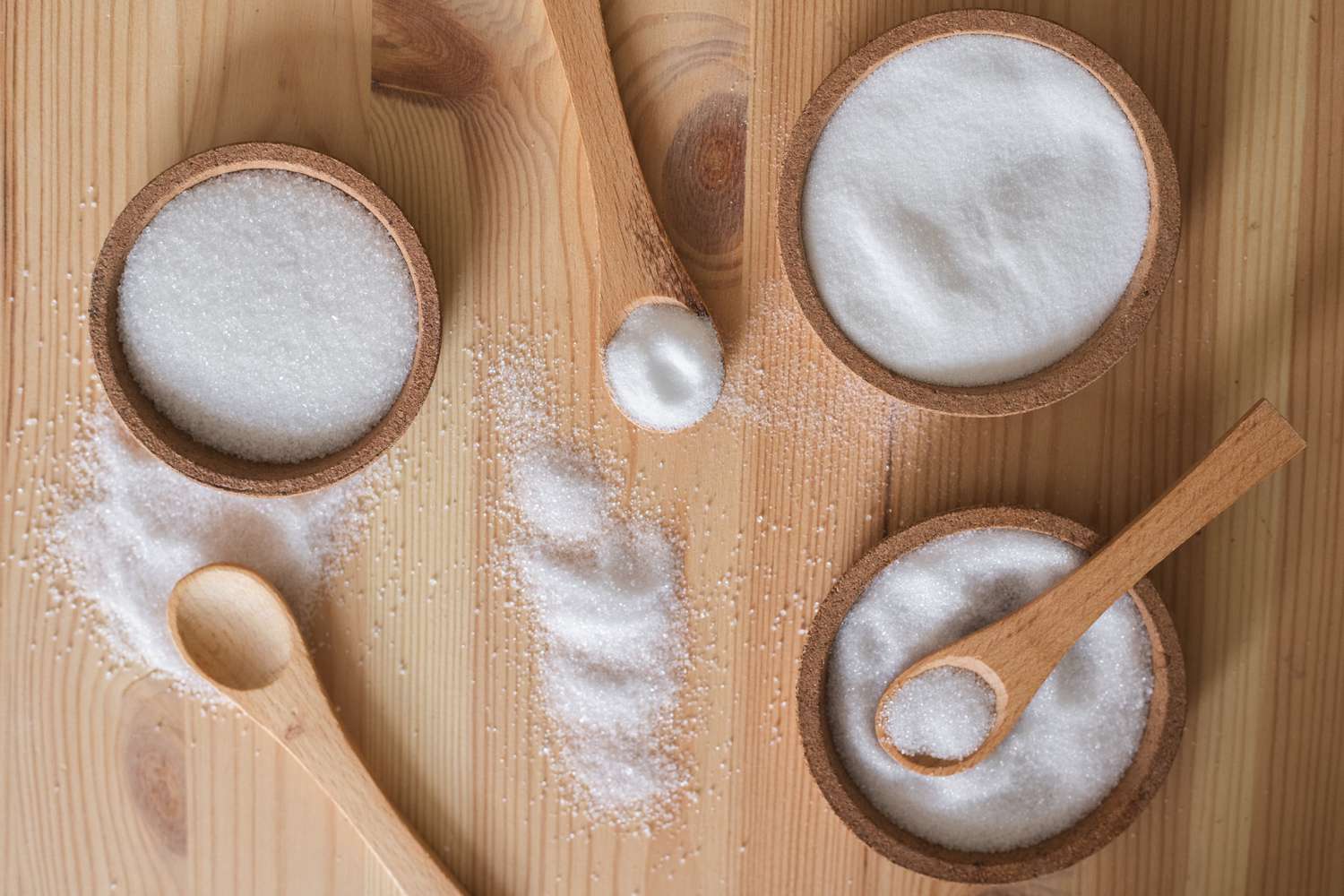
Key facts
- Sugars are a type of carbohydrate.
- Sugar itself does not contain any essential nutrients — it only provides energy.
- Foods and drinks may contain a combination of naturally-occurring sugars and added sugars.
- Overconsumption of sugar can lead to obesity and other health risks.
- Sugar-sweetened drinks can make it easier to overconsume sugar — because they don’t make you feel ‘full’ or satisfied.
What is sugar?
A sugar is a type of carbohydrate. Like other carbohydrates, sugars are a source of energy for your body. Sugars can occur naturally in foods or be added to foods and drinks.
- Naturally-occurring sugars include lactose in milk, fructose in fruit and honey, glucose in fruits and vegetables, and maltose in wheat and barley.
- Added sugars is the name given to sugars that are added to a food by the person or manufacturer preparing it. Sugars are added by manufacturers for many reasons — including to make food taste sweeter, extend its shelf life or improve its appearance.
There is no difference chemically between naturally-occurring sugar and added sugar. Naturally-occurring sugars are not necessarily healthier than added sugars. But naturally-occurring sugars are more likely to be in foods alongside useful nutrients such as fibre, and vitamins and minerals.
Some foods and drinks contain a combination of both natural sugars and added sugars. For example, yoghurt contains lactose, a sugar that is naturally present in dairy foods, but may also contain sugar added by the manufacturer to sweeten the taste.
What are the health risks of added sugar?
Added sugars tend to be found in foods that are low in vitamins and minerals and that are high in kilojoules. A kilojoule is the unit of measurement of energy in food. Energy-dense foods are easy to overconsume and can displace more nutritious choices from your diet. They are referred to as ‘discretionary foods’ because they’re not necessary to meet any of your dietary needs.
By contrast, sugars that occur naturally in vegetables, fresh fruits and milk usually exist alongside beneficial nutrients, such as fibre, vitamins and minerals.
Consuming too much added sugar can contribute to:
- obesity — high sugar consumption is linked to weight gain and obesity
- heart disease — consuming too much added sugar has been linked to an increased risk of cardiovascular disease. Switching to a diet low in added sugars and choosing wholegrain carbohydrates instead of refined carbohydrates (such as white pasta and white rice), may reverse the risk.
- tooth decay — acid produced by bacteria can attack tooth enamel, causing permanent cavities in teeth. High-sugar diets can feed these bacteria.
- fatty liver disease — consuming high amounts of added sugar can lead to a greater accumulation of fat in the liver, which may lead to fatty liver disease
There is no evidence that eating sugar causes attention deficit hyperactivity disorder (ADHD).
Can eating too much sugar give you diabetes?
Eating a diet high in added sugar can lead to a person becoming overweight or obese, which in turn increases the risk of type 2 diabetes as well as some cancers and stroke. But sugar does not directly cause diabetes.
Should I limit the amount of sugar I consume?
Because of the health risks associated with added sugars, it’s recommended that you watch your sugar intake.
The World Health Organization (WHO) recommends:
- Adults and children should reduce their intake of sugar to less than 10% of their total daily energy intake. On average, this equals about 12 teaspoons (50 grams) of sugar per day for an adult. This include all added sugars, as well as the naturally-occurring sugars in honey, fruit juices, syrups and fruit-juice concentrates.
- Reducing your intake to less than 5% of total energy intake (6 teaspoons or 25g) would provide even more health benefits. Read the nutrition panel on the food label. If the total sugar exceeds 15g of sugar per 100g of the food, check the list of ingredients to see if any added sugars are high on the list. For more information, see ‘Where do I find added sugars on food labels?’, below.
What foods are high in added sugars?
Many packaged foods and drinks contain large amounts of added sugars, including:
- cakes, muffins, scones and biscuits
- soft drinks and cordials
- sports, energy and vitamin drinks
- fruit and vegetable juices
- ice cream, desserts and lollies
- tomato ketchup and sauces, such as pasta sauce and stir-fry sauces
- some breakfast cereals and muesli bars
- dried fruit
- certain low-fat foods, such as yoghurt
- salad dressings, pickles and chutneys
Where do I find added sugars on food labels?
Learning how to read food labels can help you manage the amount of sugar in your diet. Labels tell you if any sugars have been added, as well as the total amount (in grams) of sugar in a product.
Check the:
- ingredients list — ingredients are listed in order of weight. The higher up the list, the bigger the proportion of that ingredient. Sugars may be listed as sucrose, glucose, dextrose, maltose, golden syrup, maple syrup, molasses, coconut sugar, agave syrup or others. High-fructose corn syrup is another added sugar, but it’s not common in Australia.
- nutrition information panel — sugars are listed under ‘Carbohydrates’. The amount of sugar per 100g is an easy way to compare products for their sugar content. For example, if one cereal brand has 10g of sugar per 100g and another has 5g of sugar per 100g, the second option may be the better one.
The amount of sugar per serve shows how much sugar you will consume in one suggested serve of the product. This is a measure of total sugar — both naturally-occurring and added sugar.
How can I reduce my sugar intake?
You don’t need to avoid sugar altogether. Fruit, vegetables and dairy foods all contain naturally-occurring sugars, and are also sources of fibre, vitamins and minerals, such as calcium.
You should, however, avoid overconsuming added sugars. Check food labels, as above.
Sugar-sweetened drinks can make it easy to overconsume sugar because they don’t help your body to feel ‘full’ or satisfied.
To reduce added sugars, you could also:
- replace breakfast cereals containing dried fruit with fruit-free muesli or porridge
- cook eggs for breakfast
- buy plain, unsweetened yoghurt and add fresh fruit to sweeten it, if you wish
- make your own sauces with wine, vinegars, tomatoes, herbs, spices, onion or garlic
- flavour food with herbs and spices, such as chilli
- cut back on discretionary foods, such as cakes, biscuits, desserts and ice cream
- drink plain water, soda water or mineral water rather than sweetened drinks, sports drinks or iced tea
Are sugar substitutes better for you?
There are sweeteners that can replace sugar — and some are kilojoule-free. They’re often used to sweeten drinks such as tea or coffee, or as an alternative to sugar when baking or cooking.
There are 3 types of sugar substitutes:
- Artificial sweeteners — such as aspartame, saccharin and sucralose — have no kilojoules. They are used widely by the food industry in products labelled ‘diet’ or ‘no sugar’. (However people with the rare genetic condition phenylketonuria can’t have aspartame since it contains an amino acid their body can’t break down, called phenylalanine.)
- Nutritive sweeteners — such as fructose, isomalt, mannitol, xylitol, sorbitol and polydextrose — are not kilojoule-free. They either have the same (or less) energy than sugar.
- Natural intense sweeteners — such as stevia and monk-fruit extract — are kilojoule-free and generally made from plants. Because they are much sweeter than sugar, only small amounts may be needed.
Remember, sugar substitutes may still cause tooth decay, and evidence is mixed regarding whether they help with weight loss.
Are low or sugar-free diets OK?
Sugar detox or quit-sugar diets may completely restrict all sugar — or just added sugars — from your diet. This can result in short-term weight loss but may not be sustainable.
A zero-sugar diet would involve cutting out all fruit, vegetables, milk and some grains and legumes because of their natural sugar content. This puts a person at risk of nutritional deficiencies and is not in line with Australia’s Dietary Guidelines.
In this case it’s nearly impossible to get enough nutrients and fibre without taking supplements. Healthy carbohydrates are also needed for the beneficial gut bacteria that keep your digestive tract healthy.
However, restricting added sugars is sensible since these are common in energy-dense, nutrient-poor discretionary foods and drinks.
Do some people have a problem digesting sugars?
Yes, some people have an intolerance to certain sugars — which is different from food allergies. Whether they experience symptoms may depend on how much of the food is consumed.
Examples of sugar intolerances include:
- lactose intolerance — where a person has a temporary or permanent problem digesting lactose, a sugar found in dairy products
- FODMAPs intolerance (‘FODMAP’ stands for Fermentable Oligosaccharides, Disaccharides, Monosaccharides and Polyols) — where foods containing various sugars or sugar alcohols, including fructose and mannitol, cause digestive symptoms such as bloating, flatulence, diarrhoea or constipation
If consuming certain foods or sugars causes you to have digestive symptoms, see your doctor or a dietitian. An accredited practising dietitian (APD) can help you with nutritional advice and a personalised eating plan that considers your individual medical circumstances.


